Star Interview: Anna Zatonskih
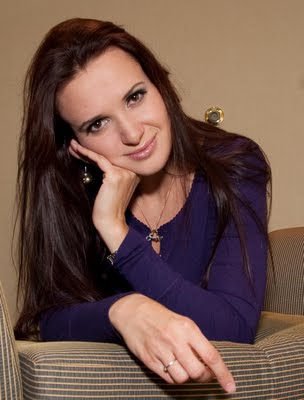
This year has been a great year for US players. Two very successful US-championships for men and women have been held in Saint-Louis, many young American players participated successfully in the youth championships and after visiting the Supernationals and National scholastic chess tournaments in the US one can say that chess is definitely on the go in the USA.
From October 4 to October 13, the 2009 US women's chess championship took place. The tournament had the highest prize-fund in the history of the US women's championships. All the strongest women US players took part in it and it was won convincingly by Anna Zatonskih with the fantastic result of 8,5 out of 9.
Immediately after the tournament I asked Anna a few questions and it is a pleasure for me now to introduce this new chess star on my blog: the strong chess-player, adventurer and chess mom Anna Zatonskih!
Interview of Anna Zatonskih conducted by Alexandra Kosteniuk:
Alexandra Kosteniuk - Congratulation on your win at the 2009 women's US chess championship! 8,5 out of 9 - is an impressive result! Tell us a little bit about the tournament, the organization, how it felt to play in Saint Louis.
Anna Zatonskih - The organization was just superb! That was already my second trip to Saint Louis this year. The first one was for the men’s US chess championship and was not very successful for me. I just started the tournament, played two games and was hospitalized. My friends were telling me: “Don’t’ worry, you’ll get better, you’ll come back in October and will take first prize”.
The organization team in Saint Louis is just great. In May, during the US men’s championship I was staying at the main organizer’s home. Everybody is very kind and you feel like playing chess. You feel like you are doing something really important. Also, there was the highest prize-fund of the women’s US championships in history. Everything that we wished for, was instantly done by the organizers. The playing hall was very nice. I think I wouldn’t be mistaken if I’d say that the Saint Louis Chess Club is the best chess club in America and also the best chess club I have ever seen. When you are in this club you can see that people who have created it love chess and put their soul in every detail as it was their house. The media coverage of the event was fantastic.
The ICC boradcasts of Jeniffer Shahade, Macauley Peterson were just great. Many interesting side-events took place during the tournament.
AK – What was your best game in the tournament?
AZ – A few moves that I made during this tournament were special for me. First of all, it’s the move b5 in the game against Irina Krush.
the position before 22. ... b5!
It is rather a simple move but it doesn’t come to your mind, I didn’t notice it immediately.
[Event "ch-USA w"]
[Site "Saint Louis USA"]
[Date "2009.10.6"]
[Round "3"]
[White "Krush,I"]
[Black "Zatonskih,A"]
[Result "0-1"]
[Eco "D56"]
1.d4 d5 2.c4 e6 3.Nc3 Be7 4.Nf3 Nf6 5.Bg5 h6 6.Bh4 O-O 7.e3 Ne4
8.Bxe7 Qxe7 9.Rc1 Nxc3 10.Rxc3 c6 11.Qc2 Nd7 12.cxd5 exd5 13.Bd3
Nb6 14.O-O Be6 15.Rb1 a5 16.Nd2 Nc8 17.Ra3 Nd6 18.Qc5 Qc7 19.Rc3
Rfc8 20.Rbc1 Qd8 21.h3 Bf5 22.Bf1 b5 23.Rb3 Nb7 24.Qa3 b4 25.Qa4
c5 26.dxc5 Nxc5 27.Qb5 Rab8 28.Qe2 a4 0-1
Second, the 41st move a4 in the game against Alisa Melekhina
The position before 41. a4!
[Event "ch-USA w"]
[Site "Saint Louis USA"]
[Date "2009.10.10"]
[Round "6"]
[White "Zatonskih,A"]
[Black "Melekhina,A"]
[Result "1-0"]
[Eco "E62"]
1.d4 Nf6 2.c4 g6 3.Nc3 Bg7 4.g3 O-O 5.Bg2 d6 6.Nf3 Bd7 7.O-O
Qc8 8.Re1 Bh3 9.Bh1 Bg4 10.Bg5 Re8 11.Qd2 c6 12.Rad1 Nbd7 13.Bh6
Bh8 14.Ng5 Nf8 15.Bg2 Ne6 16.f3 Nxg5 17.Bxg5 Bh3 18.Bxh3 Qxh3
19.e4 Nh5 20.Qf2 Bf6 21.Be3 b6 22.f4 c5 23.e5 cxd4 24.Bxd4 dxe5
25.fxe5 Bh8 26.Nd5 Rac8 27.b3 Qe6 28.Bb2 Ng7 29.Rf1 h5 30.Nf4
Qf5 31.Qe2 Ne6 32.Nd5 Qg4 33.Qg2 h4 34.gxh4 Qxh4 35.Rd3 Bg7 36.Rh3
Qg5 37.Rg3 Qh5 38.Rh3 Qg5 39.Rg3 Qh5 40.Qf2 g5 41.a4 Rcd8 42.Qf5
Qg6 43.Qg4 Kh7 44.h4 Bh6 45.Qf3 Rf8 46.h5 Qc2 47.Rg2 g4 48.Qxg4
Rg8 49.Rxf7+ Kh8 50.Rxc2 Rxg4+ 51.Rg2 Rxg2+ 52.Kxg2 Nf4+ 53.Nxf4
Rd2+ 54.Kf3 Rxb2 55.Ng6+ Kg8 56.Rxe7 Rxb3+ 57.Ke4 Rb4 58.Rc7
Rxa4 59.e6 Ra1 60.Rc8+ Kg7 61.e7 Re1+ 62.Kd5 Kf7 63.Rf8+ 1-0
and also the Be4 move from my game with Foisor.
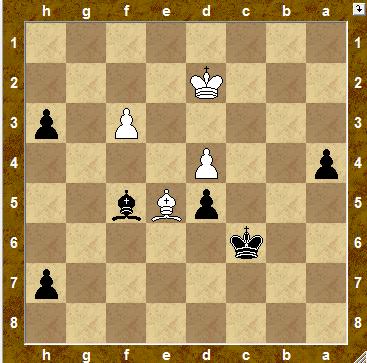
The position before 56. ... Be4!
[Event "2009 US Women's Ch."]
[Site "St.Louis"]
[Date "2009.10.12"]
[Round "8"]
[White "Foisor, Sabina Francesca"]
[Black "Zatonskih, Anna"]
[Result "0-1"]
[Eco "D35"]
1.d4 d5 2.c4 e6 3.Nc3 Be7 4.cxd5 exd5 5.Bf4 Nf6 6.Qc2 c5 7.e3
cxd4 8.exd4 Nc6 9.Bb5 Qb6 10.Nge2 O-O 11.Bxc6 Qxc6 12.O-O Be6
13.Rac1 Rac8 14.f3 Qd7 15.g4 b5 16.a3 Ne8 17.Qb3 a6 18.Bg3 Rc4
19.Rcd1 f6 20.Rfe1 Bf7 21.Nf4 Nc7 22.Qc2 b4 23.axb4 Bxb4 24.Qf5
Qxf5 25.gxf5 Nb5 26.Nfe2 Nxc3 27.bxc3 Bxc3 28.Nxc3 Rxc3 29.Kf2
Rfc8 30.Re3 Rxe3 31.Kxe3 Rc3+ 32.Rd3 Rxd3+ 33.Kxd3 Bh5 34.Ke3
a5 35.Bd6 Kf7 36.Kf4 Ke8 37.Ba3 a4 38.Ke3 Kd7 39.h3 Kd8 40.Bf8
Ke8 41.Bc5 Kf7 42.h4 Kg8 43.Kf4 Be8 44.Ba3 Bb5 45.Ke3 Kf7 46.Bb4
Bc4 47.Kd2 Bf1 48.Ke3 Bh3 49.Kf4 Ke8 50.Ba3 Kd7 51.Bf8 Kc6 52.Ke3
Bxf5 53.Kd2 g5 54.Be7 gxh4 55.Bxf6 h3 56.Be5 Be4 0-1
I also won the prize for the best game of the tournament for my game against Alisa Melekhina but for me it’s difficult to name the best game, all my games were pretty well-played. I didn’t have any worse position almost anywhere except for the first game.
AK - Tell us a little bit about the special event that you participated in before the start of the championship. You played a 5 boards-simul blindfolded.
A blindfolded defending champ. Photo Betsy Dynako
AZ - Yes, we played in the Modern Art Museum, I played against 5 players. 2 players were from Saint Louis, one player from the club, one more was the organizer of the women’s championship Rex Sinquelfield, who is doing a lot for chess in the region. Except the men’s and women’s US championships that took place in SL this year, there are big chess programs for kids, the kids chess center and they are trying to include chess to school’s programs, so we are very fortunate that so great people live in SL! The fifth players of the simul was the cousin of Rex. I would say that the strongest players were 1700-1800 and the others are a little bit weaker. Of course I felt tremendous pressure since there were quite many people watching and I was very afraid to forget anything. The games of the simul can be found here.
AK - Did you have any prior experience with this kind of simuls?
AZ - When I was working in Long Island in a very good non-for-profit organization which is called the Great Knights, I often gave blindfolded simuls in clubs and they were quite successful, kids liked it but especially their parents. So I had some experience with this kind of simuls and when we talked with Jennifer about different possible events during the championship we decided that a blindfold simul is an interesting idea.
AK - Weren’t you afraid that the blindfolded simul just before the beginning of the important US championship is a too difficult challenge for your brain? They say that blindfolded chess is a very big strain for the brain and in the USSR this kind of chess was even prohibited due to the belief that it could be dangerous for health.
AZ – Well, some players of the tournament asked me this question. But since people from Saint Louis are doing such an amazing job for chess and I thought if I could help somehow to popularize chess as well I should do it. I thought that people will like it and they even talked about it on the radio. People might not remember my name after the simul but they knew that I was the one who gave the simul on 5 boards. I also wasn’t afraid, because I was not sure about my form since in September I played badly in the women’s world team championship, so in order to get somehow to a better chess mood I decided that I have to do something a little bit extraordinary, maybe that helped. And also the championship started only on the next day so I had some time to rest.
AK – What did you do after China? What changed since then?
AZ – I wouldn’t say that I did anything special. Maybe I just decided to relax and took it easy.
AK – Who helped you throughout the tournament.
AZ – My husband, GM Daniel Fridman was helping me, but since at the same time he was participating in the European Club Cup and we had 7 hours time difference, he was just giving me some advice, ideas, which were helpful and were very important for me. And honestly I don’t think that on our level the openings are the most important part of the game.
AK – By the way, about the level of play. I have a few questions regarding this issue to you. First of all, shortly after the end of the championship the Wall Street Journal published an article where the author asks to abolish women’s titles.
AZ – Yeah, I read this article.
.
AK – Ok, so what’s your opinion regarding this article? And the second question about it, what’s your point of view about the difference between women’s and men’s chess? And why do men play stronger then women at the moment?
AZ – Well, I think there are many differences between men and women. We should first say that we should popularize more women’s chess, we should create more possibilities for women that will attract to chess. About the article I don’t think that it’s a problem to have men’s and women’s titles and women’s titles motivate women and girls to continue playing and participate in tournaments. Maybe with some time it will be worth considering to abolish some of those titles but it’s definitely not for today. For example when I was giving lessons to kids I notice that there were much more boys then girls probably even 80% to 20%. And we have to change this, since chess is helpful for boys as well as for girls. Chess helps children to succeed in school and there are many good words about it that have already been said. Also 200 years ago there were only men playing while women were mainly housewifes and also I think chess was at the beginning invented as the game for the kings that teaches the strategical principles of battles, so at the beginning chess was considered to be a war game and war is the privilege of men. In the modern world, however, we can see that there are many girls who go to the army. Especially in Israel, in US there are many such women. I often fly in airplanes and see these girls. And it's the same for chess, nowadays there are many more girls and women who play chess. That’s why the difference between women’s and men’s chess 50 years ago was just huge, today, maybe slowly but steadily women are moving forward chesswise and most likely in a few more years women will play chess better compared to today. Also professional chess requires a lot of energy and often women who become mothers face problems since to play chess professionaly one needs to go to chess camps and to go away for a long time and according to Nature women tend to prefer to spend more time with their family. So in other words we have been created differently and we have different priorities in life. And I think it’s absolutely natural to have separate women’s and men’s tournaments. In the USSR we had different categories and in order to get this category a man or a woman needed to fulfill some norms and these norms were different for men and for women, so if we consider chess a sport, why should we have the same norms for men and for women?
AK – Yes, but the supporters of the Wall Street Journal article say that chess is not a physical, but rather an intellectual kind of sport and women can compete on the same level with men. Of course being a professional chess player myself I understand that one need to have great physical capabilities to play chess professionaly on a very high level but still these people say that women should be able to compete on the same level as men on the intellectual fields.
AZ – Well, chess is like gymnastics for the brain, but it’s still gymnastics. On the professional level when the average game can last for 5-6 hours, plus four hours of preparation one definitely needs a lot of physical strength. And still, we need to motivate more young girls to play chess and the titles are one of the way to motivate them. It's the same way with titles, as when players get trophies and medals playing in tournaments.
AK – What do you think is the most important step in improving women chess what are we lacking?
AZ – It’s a good question. We have a few good organizations that are doing a great job for promoting kids chess, so I think we have to do the same thing for women chess. In the US they are doing a great job for promoting youth chess, you and I both visited the Supernationals in Nashville in April this year and we saw how many kids participate, so we need to do the same with women. We have to create these organizations that will try to attract more girls to chess and will motivate them with different kind of scholarships to stay in chess and to continues playing chess professionaly.
Ak – Anna, tell me, for a very long time you represented the Ukraine and then you decided to change federations. First of all where were you born?
AK – And then you changed federation, by the way what is your point of view in regards of changing federation at the recent cogress of FIDE, where this problem has been discussed, since after Sergey Karjakin decided to change his federation from the Ukraine to Russia many people think the rules shall be sricter. And tell us, since you have seen both sides of chess in the Ukraine and in the US, why did you decide to change federation?
AZ – I can understand that if a player plays one Olympiad for one country then he changes his federation and at the next Olympiad plays for another country, that's ok. But I think it’s not right if every single Olympiad the player changes federation, one – for one country, the other one – for another, the third one – for some other country, I think first of all we have to have some restrictions.
AK – So why did you decide to change your federation?
AZ – Well, in the Ukraine I had some problems which I’m not ready to share with the world. I immigrated to the US and started to live here, and I changed my federation not instantly but after some thought. Also at that time we had a special programm that supportedpreparation for the women’s team for the chess olympiads and we had a very good support. And at that moment I thought that it’s the right decision, I lived in this country and I loved this country and that’s why I decided to change my federation. Today I live in Germany since I’m married to a German GM however I’m not planning to change my federation for the moment.
AK – What do you consider your homeland? For people like you, who were born in one country, then moved to another now live somewhere else.
Az – I have very strong ties with the Ukraine. When I watch the Olympic Games I always root for the Ukraine. But I've lived in the USA for a long time, and also like it very much. So it’s a very difficult question I would say both the Ukraine and the USA are my homelands.
AK – Can you tell us what differences you see between people in the Ukraine and in the USA?
AZ – Well, first of all, if we compare the USA with Europe, in the US nobody feels they are foreigners. Everybody is very patient to your accent, to your problems, they are trying to help, in some way people in the US are more well-wishing, open. Maybe that’s because the average level of living is higher in the US, than for example in the Ukraine. For example when I was living in the US on Long Island I like it there very much.
AK – How did you start playing chess?
AZ – I was the only child in my family. My parents were also chess-players. My dad has a rating around 2300, at some point he played even stronger. So they are big admirers of chess and they supported my chess lessons very much. I was about 4 or 5 years old when I started to play but I went to a chess club much later, at the age of 9 or 10.
AK – When did you decide to become a professional chess player?
AZ – I had many hobbies in my childhood. I was taking quite seriously track-and-field athletics classes, I also visited the theatrical club. At one point I couldn’t’ anymore go to track-and-field athletics so I started to spend more time playing chess. I became the champion of my city. So I would say that at the age of 13-14 I knew that most likely chess would be my profession.
AK – What are your main achievements in chess?
AZ – According to perfomance, it’s my win in the recent US championships in Saint-Louis. It’s difficult to say, but I think it’s the highest perfomance of my chess career so far. So I am a 3-times US champion, I was also the Ukranian champion among women and girls. Also my result of the 2008 chess olympiad, where we took the bronze medals and I took the gold medal on my board, and also the result of the 2004 chess olympiads.
AK – If we look at your results, there are many big successes after you became a mom in March 2007. I understand that normally the birth of a child can not help a professional chess player but in your case it seems that it motivated you even more.
AZ – Well, if we look at the facts 10 years ago I had the same Elo rating. But somehow my daugther Sophia motivates me because I think since I’m leaving my baby alone when going to tournaments I have at least to try to show the best result possible. Maybe these thoughts motivate me. And also this huge love for my baby gives me more power.
AK – Does you dauhgter say anything when you leave for tournaments?
AZ – She is very close to her grandma and I don’t have a problem with that. My mom has been with her since her birth and now she is very close to her.
AK – How often do you study chess? How many hours per day?
AZ- As much and refularly as possible. Especially just before and during tournaments.
AK – What in your point of view is the most important part of a chess game to study – opening, middle game or endgame? And what part of the game you would recommend to study to beginners?
AZ – For beginers, it’s definitely not the opening. So they have to focus on the basics which are the middle game and the endgame.
AK - Do you prefer to play chess with men or with women?
AZ – Hmm, I don’t really see the difference. I play in both kind of competitions.
AK - What is your favorite chess book?
AZ – I would definitely recommend “ My System” of Nimzowitsch, it’s a classic, that influenced my playing style a lot.
AK - If you had not become a chess player what career would you have chosen?
AZ – It’s a difficult question, I was studying accounting at the university. But now I’m more interesting in genes engineering, physics, psychology, something scientific.
AK - When did you feel happiest about being a chess player? Why?
AZ – I have two special moments. First one is my game against Votava in the Reikjavik-open,
The position before 17. ... Qxf3+
[Event "Reykjavik op 21st"]
[Site ""]
[Date "2004.3.14"]
[Round "7"]
[White "Votava Jan"]
[Black "Zatonskih Anna"]
[Result "0-1"]
[Eco "A00"]
1.g3 e5 2.Bg2 d5 3.c4 dxc4 4.Na3 Nf6 5.Nxc4 Bc5 6.Nxe5 Bxf2+
7.Kxf2 Qd4+ 8.Ke1 Qxe5 9.Qa4+ Nbd7 10.Qf4 Qe6 11.Qxc7 O-O 12.b3
Ne5 13.Nf3 Nd3+ 14.Kf1 Re8 15.Nd4 Qg4 16.Qc3 Bf5 17.Bf3 Qxf3+
18.Nxf3 Bh3+ 19.Kg1 Rxe2 20.Qxd3 Rg2+ 21.Kf1 Rxd2+ 22.Ke1 Rxd3
23.Ke2 Rd7 24.Re1 Ng4 25.Bd2 Re8+ 26.Kd1 Nf2+ 27.Kc2 Bf5+ 0-1
and now in Saint-Louis where I showed the best result of my career and people respected that.
AK - What is your favorite non-chess book?
AZ – I have many favorite books. First of all it’s Master and Margarita by Bulgakov, and Arch of Triumph by Remark;
AK - Whom do you consider the best chess player in history?
AZ – I would say it’s Kasparov and Fischer
AK - What do you like doing besides playing chess?
AZ – I like going out with my dauhgter and explaining her all the simple things. I also like riding a bicycle, going to the mountains. During the 2008 women's world chess championship in Nalchik I dreamt about going to the top of the Elbrus Mountain.
AK - What is the best chess country in the world?
AZ – I have heard a lot of good things about Iceland.
AK - What is the best organized women’s tournament you took part in?
AZ – Saint Louis and also I remember a rapid tournament in China in 2005.
AK - What is your goal in chess?
AZ – I don’t really have a goal in chess, I try to enjoy the game.
AK - What is your favorite chess piece?
AZ – All pieces, maybe the most important one - the king.
AK - What is your favorite kind of food?
AZ – I like chinese, indian food, spicy food.
AK - What is your favorite place in the world?
AZ – First of all, it's Curacao, I tried scuba-diving there for the first time, and basically I like all water kind of sports very much. There is also a place Blue Lagoon in Iceland that’s I liked very much, and the Elbrus area amazed me a lot.
Anna, thank you very much for your time. I wish you all the best and we hope to hear of your great results in the future!
Posted by: Alexandra Kosteniuk
Women's World Chess Champion
Labels: us women's chess championship, Zatonskih



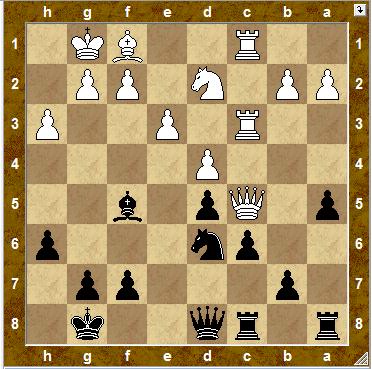
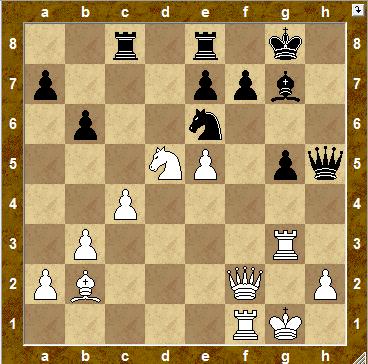
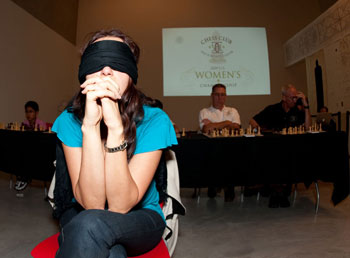
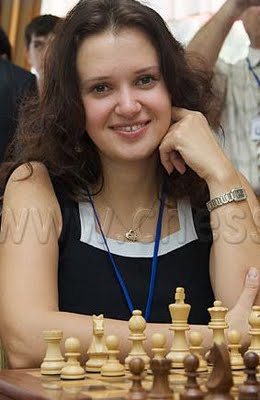
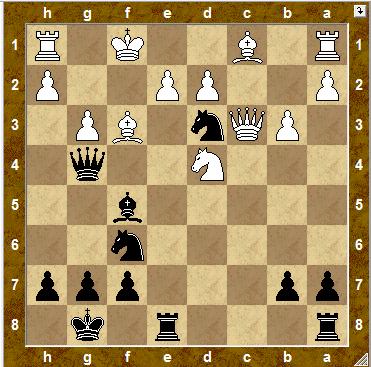
































2 Comments:
At December 26, 2009 at 2:01 PM , PetrS said...
PetrS said...
Thank you for very nice interview! It is always useful to learn more about the top chess players!
Merry Xmas, Alexandra ;)
At December 26, 2009 at 5:42 PM , Elmer D. Escoto said...
Elmer D. Escoto said...
Great Anna! And thanks to Alexandra for bringing this to us. Love and kisses.
Post a Comment
Note: Only a member of this blog may post a comment.
Subscribe to Post Comments [Atom]
<< Home